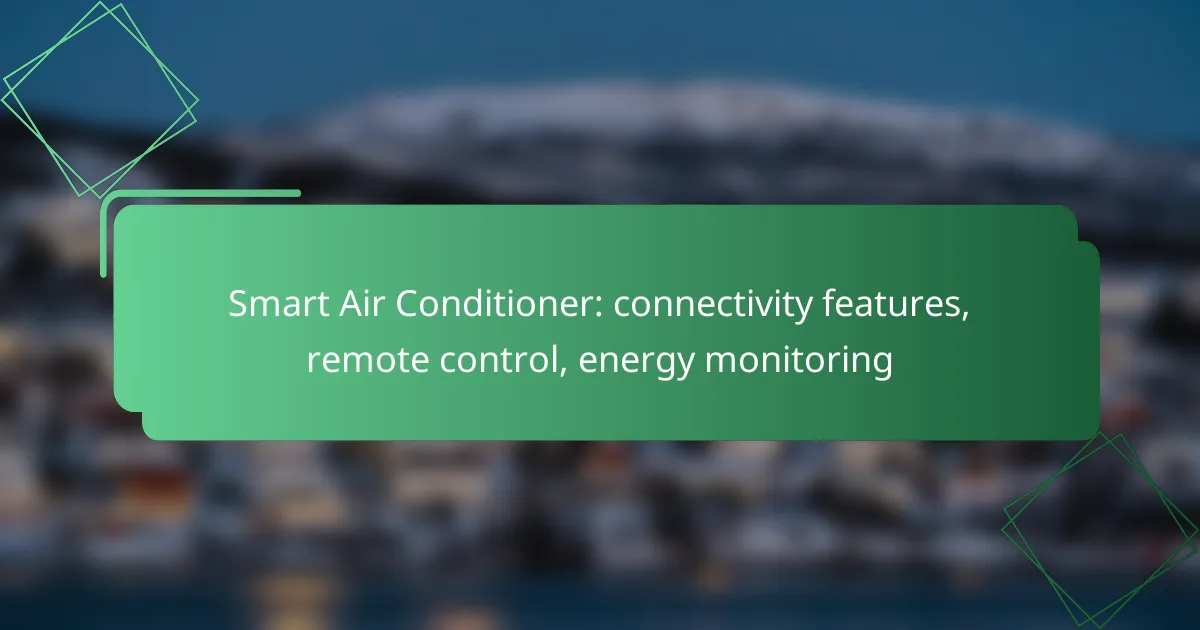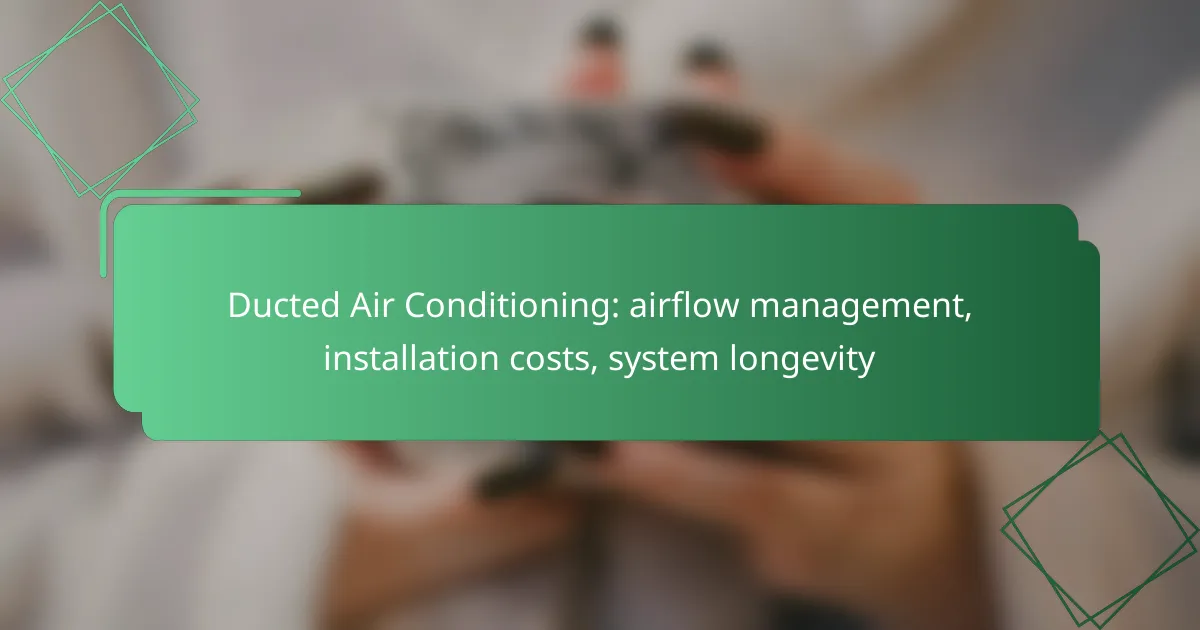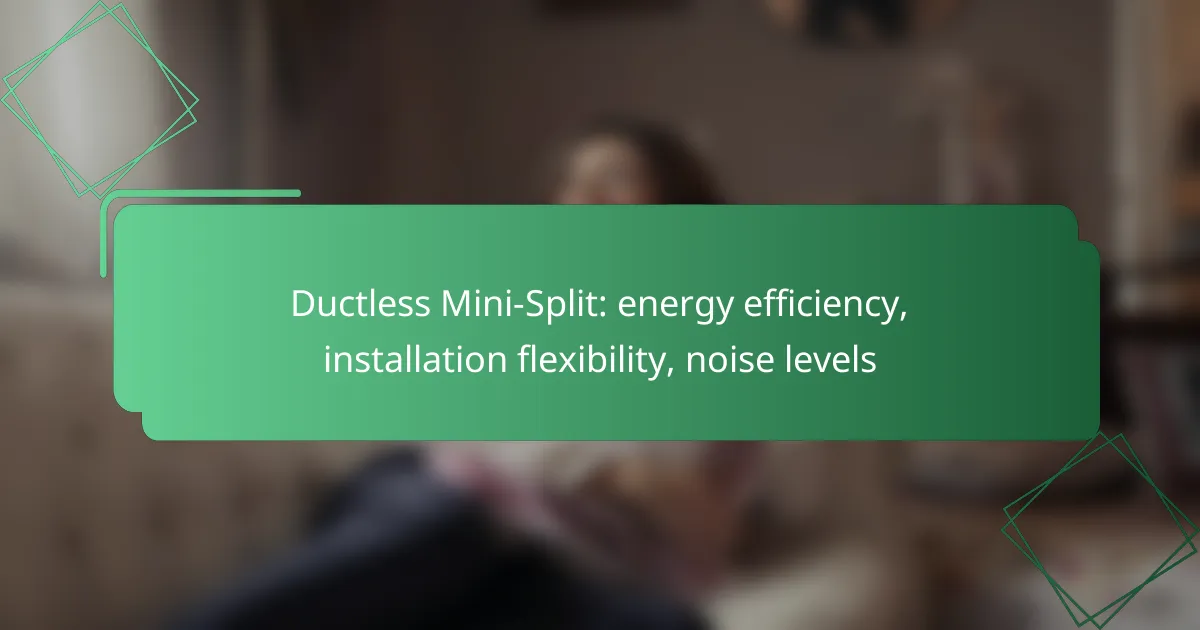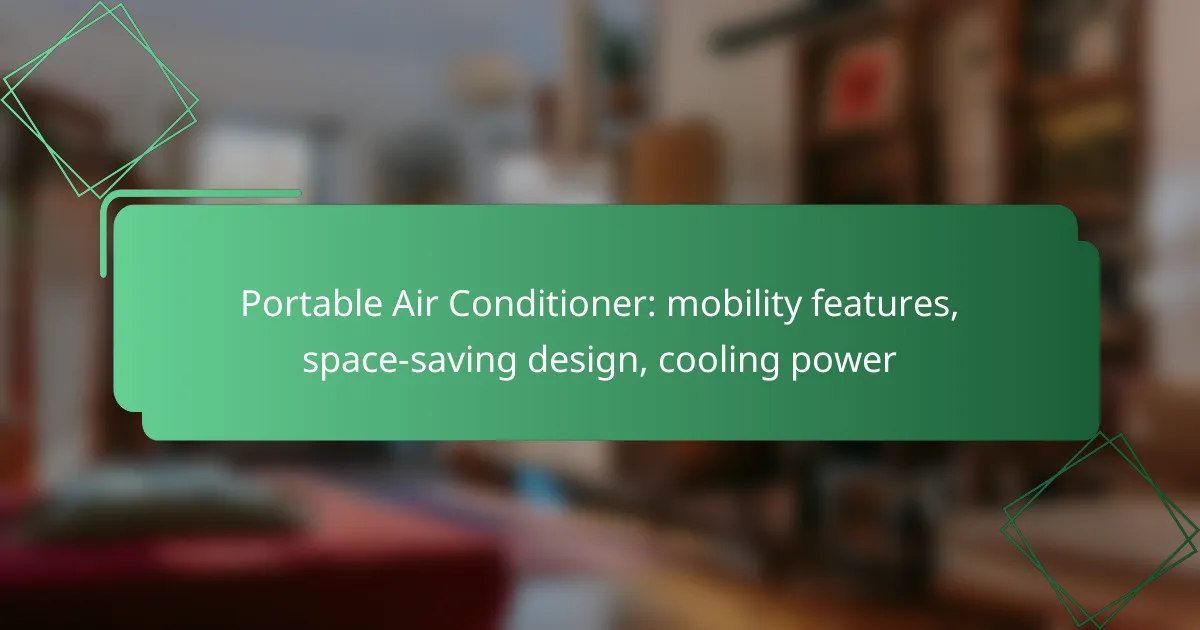Smart air conditioners are revolutionizing home climate control with their advanced connectivity features, enabling users to manage their systems remotely through mobile apps and voice commands. Models like the LG Dual Inverter and Daikin Emura not only provide efficient cooling but also offer energy monitoring to help users optimize their energy consumption. With built-in Wi-Fi, these units seamlessly integrate into home networks, enhancing convenience and comfort.
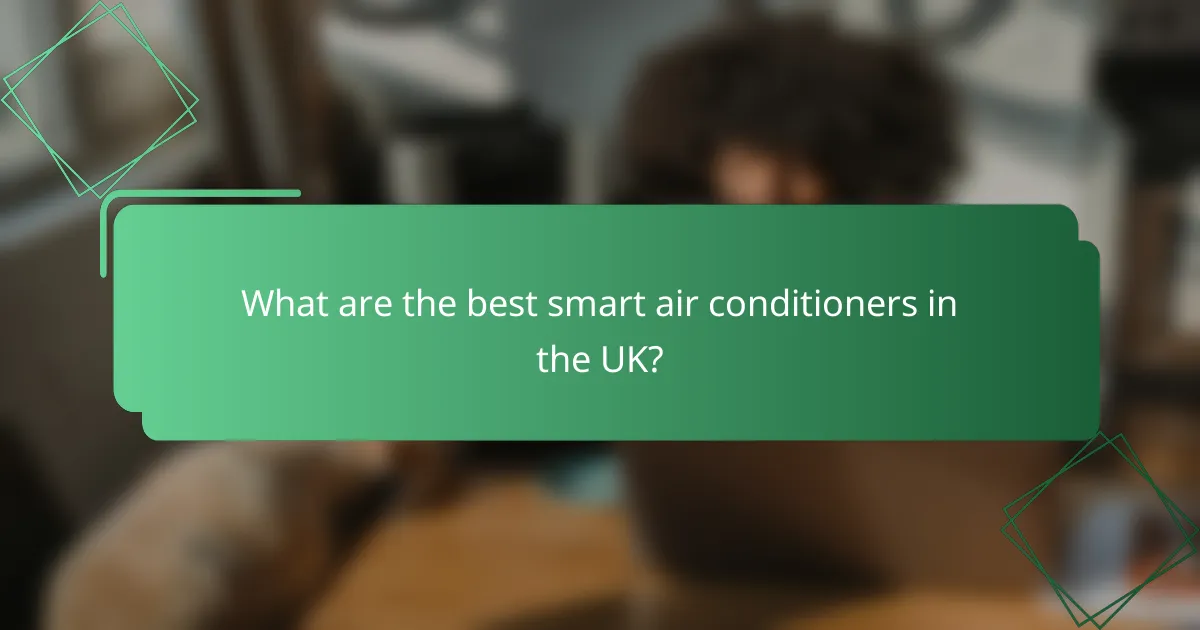
What are the best smart air conditioners in the UK?
The best smart air conditioners in the UK combine advanced connectivity features, remote control capabilities, and energy monitoring to enhance comfort and efficiency. Models like the LG Dual Inverter, Daikin Emura, and Samsung Wind-Free stand out for their performance and user-friendly technology.
LG Dual Inverter Smart Air Conditioner
The LG Dual Inverter Smart Air Conditioner is known for its energy efficiency and quiet operation. It uses dual rotary compressors to reduce energy consumption by up to 70% compared to traditional units, making it a cost-effective choice for cooling.
This model features Wi-Fi connectivity, allowing users to control the air conditioner remotely via a smartphone app. You can set schedules, adjust temperatures, and monitor energy usage from anywhere, which is particularly useful for managing energy costs.
Daikin Emura Smart Air Conditioner
The Daikin Emura Smart Air Conditioner is designed with aesthetics and functionality in mind. It offers a sleek design and advanced features like intelligent eye technology, which detects human presence and adjusts cooling accordingly to save energy.
With built-in Wi-Fi, the Daikin Emura can be controlled through a mobile app, enabling users to adjust settings remotely. It also provides detailed energy monitoring, helping users understand their consumption patterns and optimize usage.
Samsung Wind-Free Smart Air Conditioner
The Samsung Wind-Free Smart Air Conditioner utilizes a unique cooling technology that disperses air through micro holes, creating a gentle breeze without the discomfort of direct airflow. This feature enhances comfort while maintaining energy efficiency.
This model supports smart connectivity, allowing control via the SmartThings app. Users can set schedules, receive maintenance alerts, and monitor energy usage, making it easier to manage their cooling needs effectively.

How do smart air conditioners connect to Wi-Fi?
Smart air conditioners connect to Wi-Fi through built-in wireless modules that allow them to communicate with home networks. This connectivity enables users to control their units remotely and access various features via mobile applications.
Wi-Fi-enabled control systems
Wi-Fi-enabled control systems in smart air conditioners allow for seamless integration with home networks. These systems typically support popular Wi-Fi standards, ensuring compatibility with most routers. Users can easily connect their air conditioners by following simple setup instructions provided in the user manual or mobile app.
When selecting a smart air conditioner, consider the range of connectivity options it offers. Some models may support dual-band Wi-Fi, which can enhance performance in environments with many devices. Always check for firmware updates to maintain optimal connectivity and security.
Mobile app integration
Mobile app integration is a key feature of smart air conditioners, enabling users to control settings from their smartphones. Most manufacturers provide dedicated apps that allow for temperature adjustments, scheduling, and energy monitoring. These apps often include user-friendly interfaces for easy navigation.
When using mobile apps, ensure that your smartphone is compatible and that you have a stable internet connection. Some apps may offer additional features like energy usage reports, which can help you optimize your air conditioner’s performance and reduce energy costs. Look for apps that provide alerts for maintenance needs, ensuring your unit runs efficiently.

What remote control options are available for smart air conditioners?
Smart air conditioners offer various remote control options, allowing users to manage their cooling systems conveniently. These options typically include smartphone apps and voice control through smart assistants, enhancing user experience and energy efficiency.
Smartphone apps
Many smart air conditioners come with dedicated smartphone apps that enable users to control their units from anywhere. These apps often allow for temperature adjustments, scheduling, and monitoring energy usage, providing a comprehensive overview of the system’s performance.
When selecting a smart air conditioner, consider the compatibility of the app with your smartphone’s operating system, whether iOS or Android. Look for features like real-time notifications and remote diagnostics, which can enhance the overall user experience.
Voice control with Alexa and Google Assistant
Smart air conditioners can be integrated with voice control systems like Amazon Alexa and Google Assistant, allowing users to operate their units hands-free. This feature is particularly useful for adjusting settings while multitasking or when your hands are full.
To use voice control, ensure that your smart air conditioner is compatible with these platforms. Setting up voice commands typically involves linking the device to your smart home network and configuring the associated app, making it easy to adjust temperature and modes with simple voice prompts.

How does energy monitoring work in smart air conditioners?
Energy monitoring in smart air conditioners involves tracking and analyzing the electricity usage of the unit in real-time, allowing users to optimize their energy consumption. This feature helps identify patterns and provides insights into how to reduce energy costs while maintaining comfort.
Real-time energy consumption tracking
Real-time energy consumption tracking allows users to see how much electricity their air conditioner is using at any given moment. Many smart air conditioners connect to mobile apps or smart home systems, providing instant feedback on energy usage in kilowatt-hours (kWh). This information can help users adjust settings to minimize energy waste.
For example, if a user notices high energy consumption during peak hours, they can set the air conditioner to operate during off-peak times, potentially saving on electricity bills. Some systems even send alerts when usage exceeds a certain threshold, prompting users to take action.
Energy efficiency ratings and reports
Energy efficiency ratings and reports provide a comprehensive overview of an air conditioner’s performance over time. These ratings often include metrics such as the Seasonal Energy Efficiency Ratio (SEER) or Energy Efficiency Ratio (EER), which indicate how effectively the unit converts electricity into cooling. Higher ratings typically correlate with lower energy costs.
Smart air conditioners can generate reports summarizing energy usage trends, efficiency ratings, and potential savings. Users can review these reports to make informed decisions about their air conditioning settings or consider upgrades to more efficient models if necessary. Regularly reviewing these reports can lead to significant savings over time.

What are the benefits of using smart air conditioners?
Smart air conditioners offer enhanced control, energy savings, and improved comfort compared to traditional units. By integrating connectivity features, these systems allow users to manage their cooling needs efficiently and conveniently.
Improved energy efficiency
Smart air conditioners are designed to optimize energy consumption, often resulting in lower utility bills. Many models utilize algorithms to adjust cooling based on occupancy patterns, outdoor temperatures, and user preferences, leading to energy savings of around 20-30% compared to standard units.
Additionally, features like programmable schedules and remote access enable users to turn off the unit when not needed, further reducing energy waste. Look for models with Energy Star ratings to ensure maximum efficiency and compliance with energy standards.
Convenience and comfort
With smart air conditioners, users can control their cooling systems from anywhere using a smartphone app. This remote control capability allows for adjustments on-the-go, ensuring that the home is at a comfortable temperature upon arrival.
Furthermore, many smart units include features such as voice control compatibility and integration with home automation systems. This means you can easily set the air conditioner to your preferred settings using simple voice commands, enhancing overall convenience and comfort in your living space.
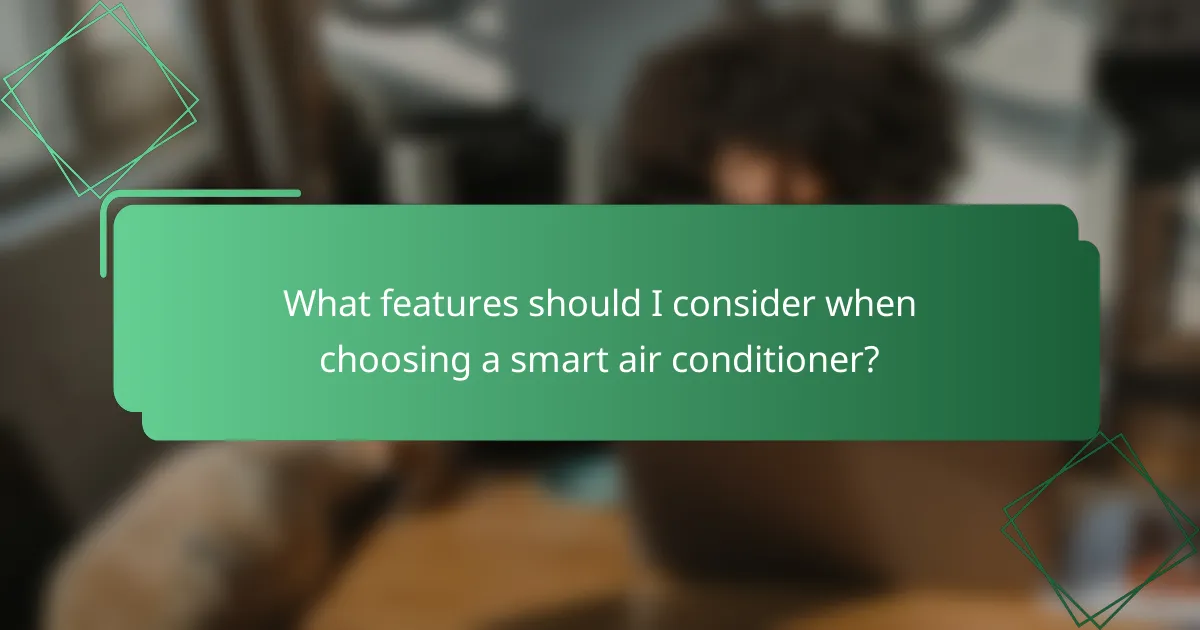
What features should I consider when choosing a smart air conditioner?
When selecting a smart air conditioner, consider connectivity features, energy efficiency ratings, and noise levels. These aspects significantly influence usability, cost savings, and comfort in your living space.
Connectivity options
Connectivity options determine how you can control your smart air conditioner. Look for models that support Wi-Fi, Bluetooth, or integration with smart home systems like Amazon Alexa or Google Assistant. This allows for remote access and control from your smartphone or voice commands.
Some air conditioners offer geofencing capabilities, which adjust the temperature based on your location. This feature can enhance convenience and energy savings by ensuring your home is cool when you arrive and conserving energy when you are away.
Energy efficiency ratings
Energy efficiency ratings, such as SEER (Seasonal Energy Efficiency Ratio) or EER (Energy Efficiency Ratio), indicate how effectively an air conditioner uses electricity. Higher ratings generally mean lower energy costs and a reduced environmental impact. Aim for units with a SEER rating above 14 for optimal efficiency.
In many regions, energy-efficient models may qualify for rebates or tax incentives, making them more financially attractive. Always check local regulations and available programs to maximize your savings.
Noise levels
Noise levels are a crucial factor for comfort, especially in bedrooms or quiet spaces. Look for air conditioners with a decibel rating below 60 dB for quieter operation. Many manufacturers provide this information, allowing you to compare models easily.
Consider the type of compressor as well; inverter compressors tend to operate more quietly than traditional ones. If noise is a significant concern, test the unit in-store or read user reviews to gauge real-world performance.
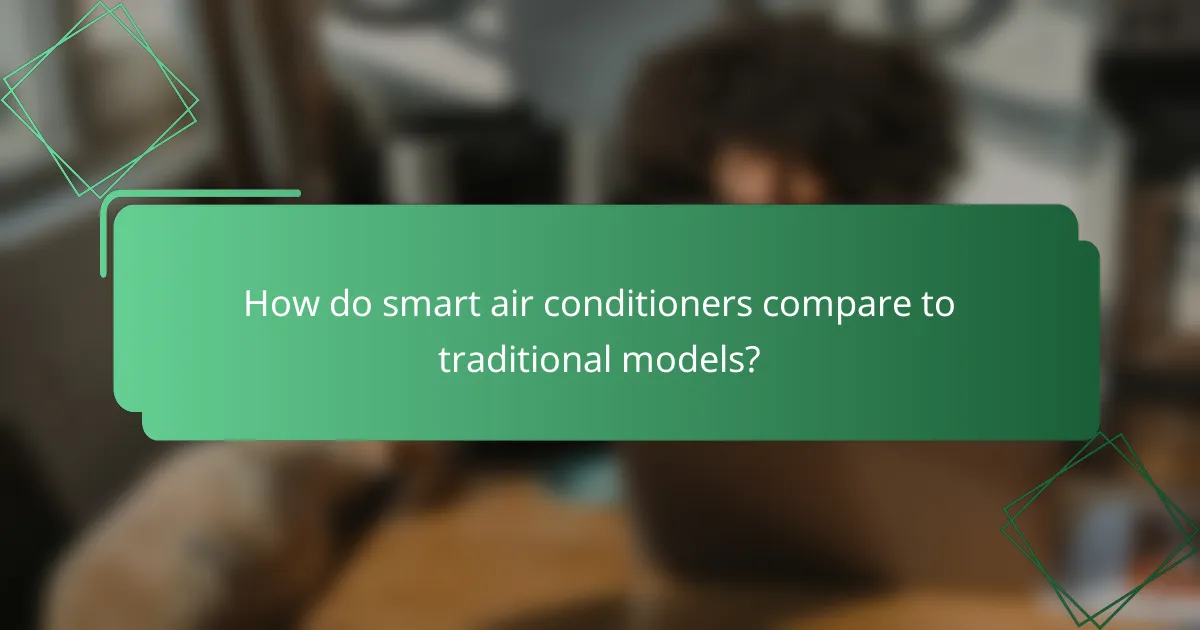
How do smart air conditioners compare to traditional models?
Smart air conditioners offer advanced features that enhance convenience and efficiency compared to traditional models. They typically include connectivity options, remote control capabilities, and energy monitoring, allowing users to optimize their cooling experience more effectively.
Energy savings
Smart air conditioners are designed to be more energy-efficient than conventional units. They often feature programmable settings and adaptive algorithms that adjust cooling based on occupancy and weather conditions, potentially reducing energy consumption by significant margins.
For instance, many smart models allow users to set schedules or control the unit remotely via smartphone apps. This means you can turn off the air conditioner when you’re not home or adjust the temperature before you arrive, leading to lower energy bills.
When considering energy savings, look for units with high Seasonal Energy Efficiency Ratio (SEER) ratings, which indicate better efficiency. Additionally, some smart air conditioners can provide real-time energy usage data, helping you identify patterns and make informed decisions about your cooling habits.






